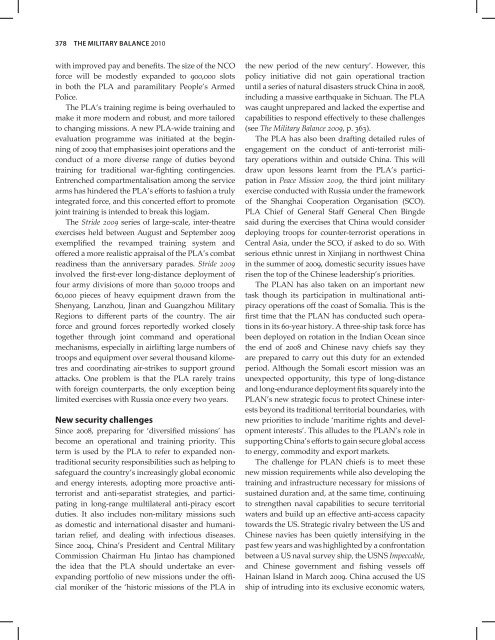You also want an ePaper? Increase the reach of your titles
YUMPU automatically turns print PDFs into web optimized ePapers that Google loves.
378 THE MILITARY BALANCE 2010<br />
with improved pay and benefits. The size of the NCO<br />
force will be modestly expanded to ���,��� slots<br />
in both the PLA and paramilitary People’s Armed<br />
Police.<br />
The PLA’s training regime is being overhauled to<br />
make it more modern and robust, and more tailored<br />
to changing missions. A new PLA-wide training and<br />
evaluation programme was initiated at the beginning<br />
of ���� that emphasises joint operations and the<br />
conduct of a more diverse range of duties beyond<br />
training for traditional war-fighting contingencies.<br />
Entrenched compartmentalisation among the service<br />
arms has hindered the PLA’s efforts to fashion a truly<br />
integrated force, and this concerted effort to promote<br />
joint training is intended to break this logjam.<br />
The Stride ���� series of large-scale, inter-theatre<br />
exercises held between August and September ����<br />
exemplified the revamped training system and<br />
offered a more realistic appraisal of the PLA’s combat<br />
readiness than the anniversary parades. Stride ����<br />
involved the first-ever long-distance deployment of<br />
four army divisions of more than ��,��� troops and<br />
��,��� pieces of heavy equipment drawn from the<br />
Shenyang, Lanzhou, Jinan and Guangzhou Military<br />
Regions to different parts of the country. The air<br />
force and ground forces reportedly worked closely<br />
together through joint command and operational<br />
mechanisms, especially in airlifting large numbers of<br />
troops and equipment over several thousand kilometres<br />
and coordinating air-strikes to support ground<br />
a�acks. One problem is that the PLA rarely trains<br />
with foreign counterparts, the only exception being<br />
limited exercises with Russia once every two years.<br />
New security challenges<br />
Since ����, preparing for ‘diversified missions’ has<br />
become an operational and training priority. This<br />
term is used by the PLA to refer to expanded nontraditional<br />
security responsibilities such as helping to<br />
safeguard the country’s increasingly global economic<br />
and energy interests, adopting more proactive antiterrorist<br />
and anti-separatist strategies, and participating<br />
in long-range multilateral anti-piracy escort<br />
duties. It also includes non-military missions such<br />
as domestic and international disaster and humanitarian<br />
relief, and dealing with infectious diseases.<br />
Since ����, China’s President and Central Military<br />
Commission Chairman Hu Jintao has championed<br />
the idea that the PLA should undertake an everexpanding<br />
portfolio of new missions under the official<br />
moniker of the ‘historic missions of the PLA in<br />
the new period of the new century’. However, this<br />
policy initiative did not gain operational traction<br />
until a series of natural disasters struck China in ����,<br />
including a massive earthquake in Sichuan. The PLA<br />
was caught unprepared and lacked the expertise and<br />
capabilities to respond effectively to these challenges<br />
(see The Military Balance ����, p. ���).<br />
The PLA has also been drafting detailed rules of<br />
engagement on the conduct of anti-terrorist military<br />
operations within and outside China. This will<br />
draw upon lessons learnt from the PLA’s participation<br />
in Peace Mission ����, the third joint military<br />
exercise conducted with Russia under the framework<br />
of the Shanghai Cooperation Organisation (SCO).<br />
PLA Chief of General Staff General Chen Bingde<br />
said during the exercises that China would consider<br />
deploying troops for counter-terrorist operations in<br />
Central Asia, under the SCO, if asked to do so. With<br />
serious ethnic unrest in Xinjiang in northwest China<br />
in the summer of ����, domestic security issues have<br />
risen the top of the Chinese leadership’s priorities.<br />
The PLAN has also taken on an important new<br />
task though its participation in multinational antipiracy<br />
operations off the coast of Somalia. This is the<br />
first time that the PLAN has conducted such operations<br />
in its ��-year history. A three-ship task force has<br />
been deployed on rotation in the Indian Ocean since<br />
the end of ���� and Chinese navy chiefs say they<br />
are prepared to carry out this duty for an extended<br />
period. Although the Somali escort mission was an<br />
unexpected opportunity, this type of long-distance<br />
and long-endurance deployment fits squarely into the<br />
PLAN’s new strategic focus to protect Chinese interests<br />
beyond its traditional territorial boundaries, with<br />
new priorities to include ‘maritime rights and development<br />
interests’. This alludes to the PLAN’s role in<br />
supporting China’s efforts to gain secure global access<br />
to energy, commodity and export markets.<br />
The challenge for PLAN chiefs is to meet these<br />
new mission requirements while also developing the<br />
training and infrastructure necessary for missions of<br />
sustained duration and, at the same time, continuing<br />
to strengthen naval capabilities to secure territorial<br />
waters and build up an effective anti-access capacity<br />
towards the US. Strategic rivalry between the US and<br />
Chinese navies has been quietly intensifying in the<br />
past few years and was highlighted by a confrontation<br />
between a US naval survey ship, the USNS Impeccable,<br />
and Chinese government and fishing vessels off<br />
Hainan Island in March ����. China accused the US<br />
ship of intruding into its exclusive economic waters,


